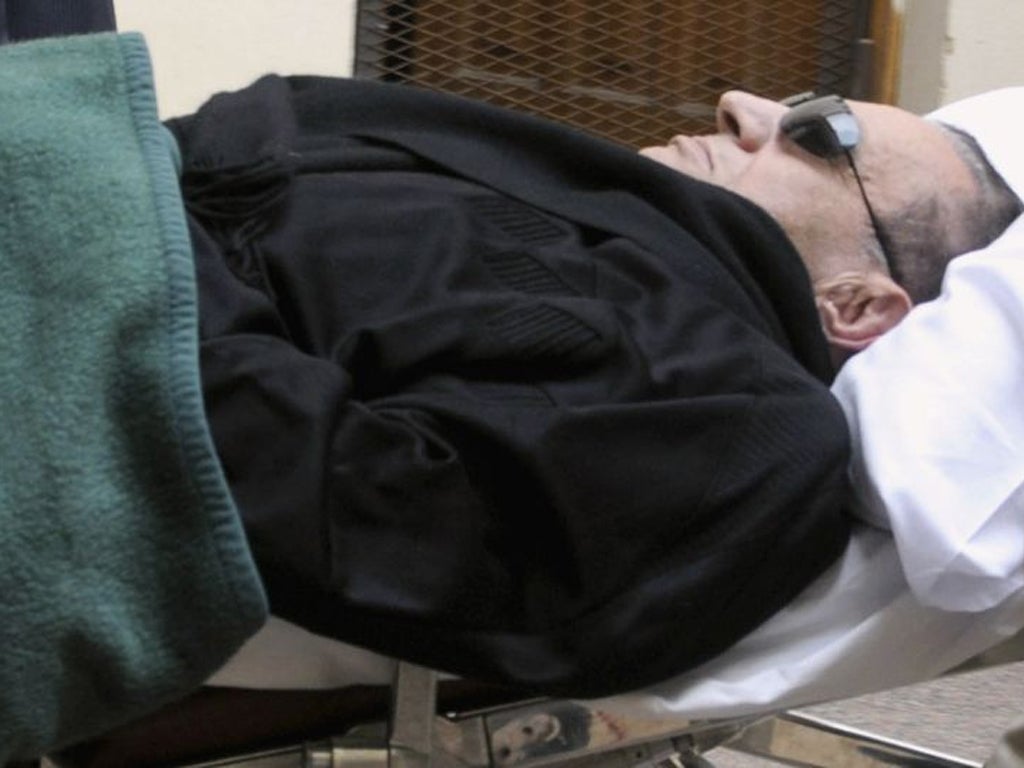Mubarak and his chiefs must hang, lawyers insist
Prosecution demands death penalty as trial of Egypt's toppled president approaches its end

Prosecutors at the trial of former Egyptian president Hosni Mubarak have demanded the death penalty for him.
Mr Mubarak is being tried in Cairo on charges of ordering the killing of demonstrators during unrest which led to his overthrow last year.
The demand also applies to former Interior Minister Habib el-Adly, and six top police commanders being tried in the same trial.
More than 800 protesters were killed during an 18-day revolt before Mr Mubarak was ousted on 11 February.
Prosecutor Mustafa Khater told the court on the final day of the prosecution's statement: "Retribution is the solution. Any fair judge must issue a death sentence for these defendants. We feel the spirits of the martyrs flying over this hall of sacred justice, and those who lost their sight by the bullets of the defendants are stumbling around it to reach the judge and demand fair retribution from those who attacked them."
Earlier in yesterday's hearing, the 83-year-old deposed leader was accused by the chief prosecutor, Mustafa Suleiman, of having been "politically and legally" responsible for the killings of protesters and of doing nothing to stop them.
He alleged that Mr el-Adly had authorised the use of live ammunition on the orders of Mr Mubarak, and that it was " irrational and illogical" to assume that Mr Mubarak did not know that "protesters were being targeted". Hanging is commonly used in Egypt as the method of execution.
Mr Suleiman said that two interior ministers who had succeeded Mr el-Adly had testified that their predecessor could not have ordered the use of live ammunition without the then Egyptian president's approval. Addressing Mr Mubarak directly, he declared: "If you had not issued these orders yourself, then where was your outburst of rage over the lives of your people?"
Mr Suleiman said that Mr Mubarak told investigators that he decided to step down after the military refused to intervene to "urgently" help security forces contain the protests.
Another prosecutor, Wael Hussein, said that the former chief of the feared state security agency Hassan Abdel-Rahman, who is one of the police commanders on trial, had given orders to allow prisoners to escape from jails across the nation during the uprising. The prisoners have been blamed for a surge in crime since the police disappeared from the streets – in a move that has never been wholly explained – after their bloody confrontation with protesters in Tahrir Square on 28 January last year.
Earlier this week, Mr Suleiman told the court that the state security apparatus now answerable to the interim military government had "deliberately refused to co-operate with the prosecution". He had been obliged to carry out an independent investigation and had only a fraction of the potential evidence against the defendants, he said.
Some lawyers in Egypt have suggested that the prosecution is struggling to prove a direct link between orders and instructions by Mr Mubarak and his henchmen, and the killing of the protesters.
Join our commenting forum
Join thought-provoking conversations, follow other Independent readers and see their replies
Comments